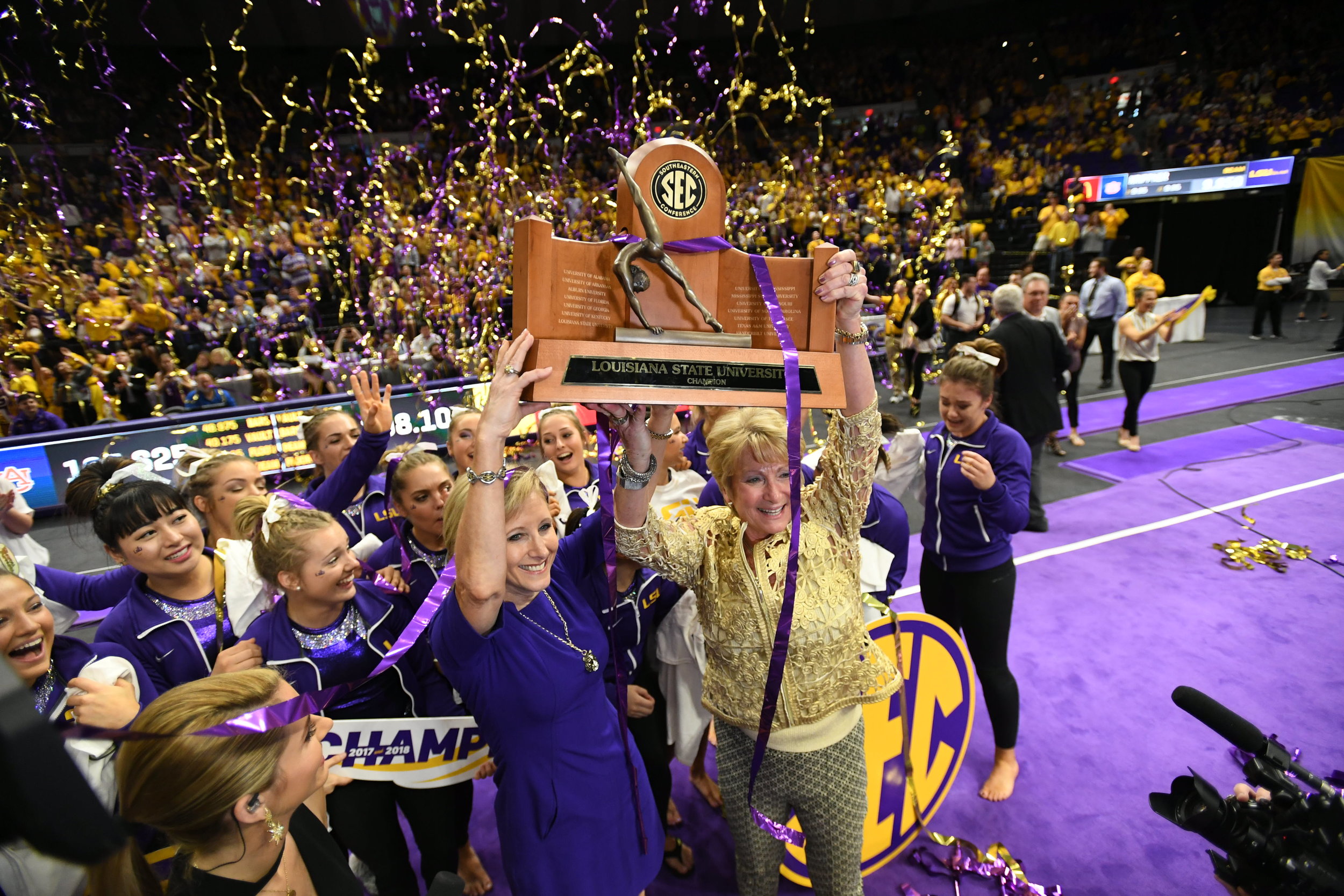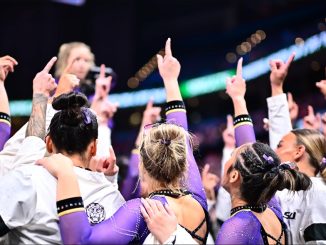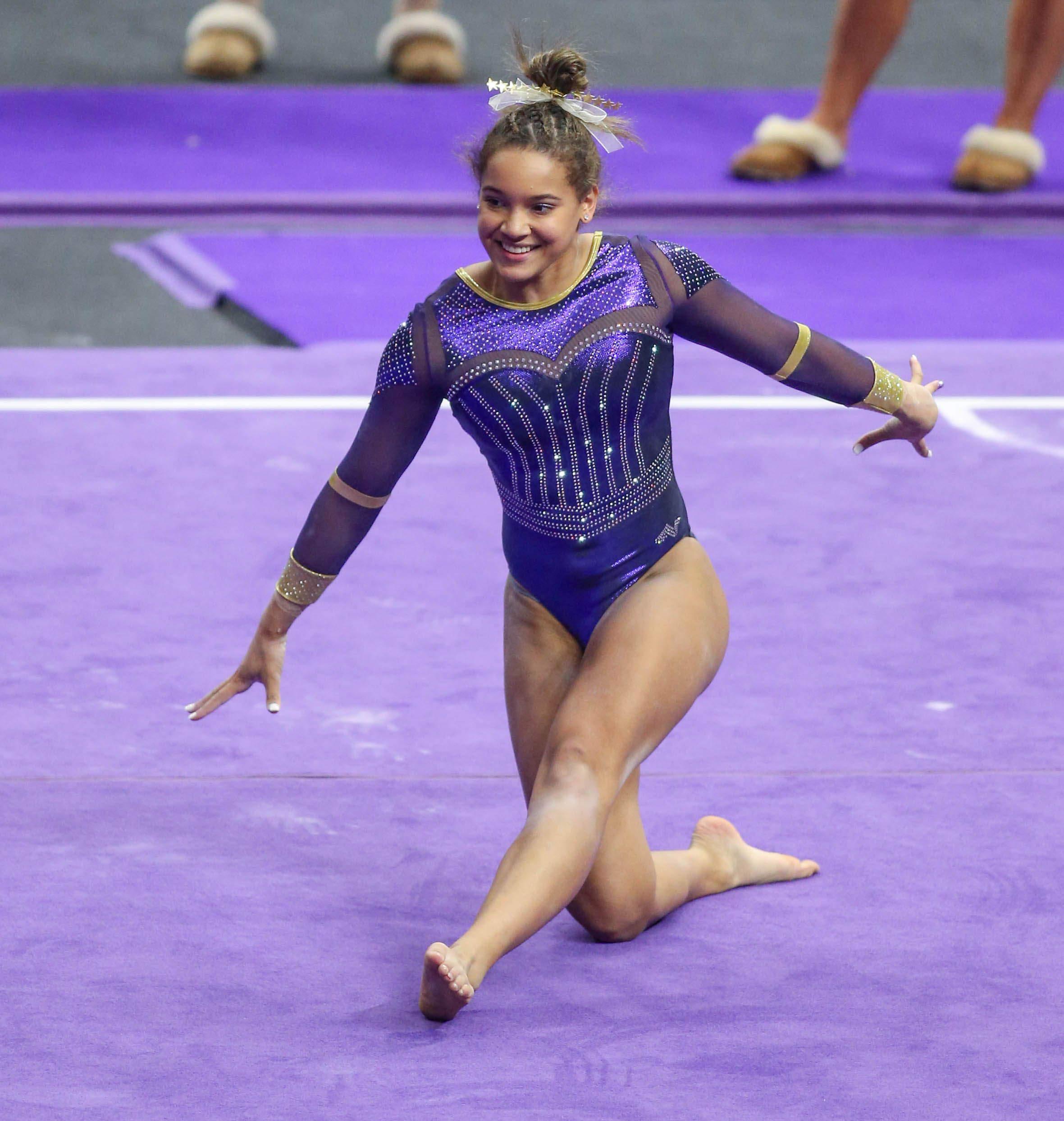
D-D Breaux retired Tuesday after 43 years as LSU’s gymnastics coach, the longest tenured coach in any sport in the history of the Southeastern Conference
Hopefully, she took the day off so the LSU sculptor-on-call could work on her statue that should be placed in front of the 3½-year old gymnastics practice facility, which also should be re-named in her honor.
It truly is the house that D-D built, a testimony to her will, grit and determination to create and maintain a program that not only became a national powerhouse – 31 top 10 finishes with program-best second place finishes in 2016, 2017 and 2019, six SEC championships and 816 wins – but also produced decades of graduates who have contributed to society and/or raised families.
There’s no better example of celebrating Breaux, whose lifelong love affair of gymmastics began as a child in Donaldsonville dancing on the porch of a nun named Sister Marie, than marveling her remarkable longevity.
“It was survival of the fittest, and I never doubted my survivability,” the unsinkable Breaux liked to say.
In her at time at LSU, there’s been nine football coaches, five men’s basketball coaches, six women’s basketball coaches and four baseball coaches.
When she became LSU’s gymnastics coach in 1978, current Tigers’ head football coach Ed Orgeron was in high school, current LSU baseball coach Paul Mainieri was a University of New Orleans baseball player and current LSU men’s basketball coach Will Wade wasn’t even born yet.
Through good seasons, down seasons, national championships contending seasons, Breaux always coached with passion. It was the essence of her D.N.A.
“You must be passionate about what you’re doing,” she said. “Then, you need a village, a group of people who care as passionately as you do. You can share the responsibilities, with everybody doing what it takes to make things work.
“Having a consistent message is critically important. I don’t think my message has changed. Now, I’ve just got some really good listeners.”
It seemed like took forever for Breaux to be heard. When then-LSU athletic director Carl Maddox named the then-24-year-old LSU graduate student as head coach, he basically threw her into the deep end of the pool and told her to swim.
Her budget was miniscule, the practice facilities substandard.
The only thing Maddox gave her was an excellent piece of advice, telling Breaux that “you’re not going to get Plan A and I’m going to tell you no, so you better come in here with a Plan B, you better have to settle for something else.”
Breaux said Maddox’s words paid dividends throughout her entire career.
“I’m not totally afraid to ask for something,” she said, “because there’s a 100 percent chance I won’t get anything if I don’t ask.”
Breaux never publicly rated her favorite ADs she worked under, but her top one was easily Skip Bertman.
Even when Bertman was LSU’s baseball coach starting in 1984 and Breaux battled to keep her program afloat, she turned to him for help.
“Skip saw my hard work, dedication and my passion,” Breaux said. “He was such a mentor and a loyal friend that after I’d get turned down by our athletic director for something I needed in the program, I’d go to Skip. He’d pay for it out of his foundation.”
Bertman connected with Breaux because he saw she had some of his characteristics to get things done no matter what roadblocks were ahead.
“You talk about fight and the things she’s been through,” Bertman said. “Every time they’d beat her down, she just turned around and came back for more. I love D-D.”
Between Maddox and Bertman, there was a string of three athletic directors who viewed gymnastics as a necessary evil to satisfy Title IX requirements.
Paul Dietzel, LSU’s 1958 national championship winning football coach who succeeded Maddox as athletic director, wasn’t a women’s athletics advocate to the point Breaux thought he wanted to eliminate gymnastics.
“One day he called me and asked that I come to his office,” Breaux said. “I didn’t go across the street to see him. I knew what he was going to do, and I just didn’t want to deal with it.”
“Bottomline Bob” Brodhead, Dietzel’s brusque successor, decided in 1983 when he hired Sue Gunter as women’s basketball coach that she needed a nice office.
“Bob Brodhead gave her my office,” Breaux said. “They put my stuff in boxes in little cubicles underneath the PMAC. It was not a good day.”
Joe Dean followed Brodhead and starting slashing budgets to get the athletic department back in the black. He eliminated Breaux’s assistants and told her to use graduate assistants.
“It’s no coincidence that I had some of my worst seasons when that happened,” she said.
But for the last 20 years, starting with Bertman (“He was all about marketing and promoting,” Breaux said), Joe Alleva who greenlit the construction of the 38,656 square foot practice facility (“Joe Alleva heard me and began to listen,” Breaux said) and finally Scott Woodward, Breaux had a closing run of athletic directors who valued and respected her.
She no longer was told by her bosses “D-D, you are just a squeaky wheel, just do your job,” she said.
Breaux didn’t have to feel like she was “a squirrel forging for nuts” as she often said, fighting for simple things for her program like having electronic billboards that football, men’s basketball and baseball already had.
“D-D Breaux’s contribution to this university, this community and to our athletic program is simply immeasurable,” Woodward said in a released statement on Tuesday. “She has had a generational impact on the student-athletes she has coached and mentored over her 43 years of service, not to mention all of the rest of us she has taught along the way.”
Having been D-D’s student sports information director in her second season – she’s been the only coach I’ve ever secretly pulled for throughout my 41-year career as a sportswriter – it’s hard for me to realize she’s finally moving to an LSU athletic department position with the title of “ambassador.”
There’s no job description for ambassador, but it’s what Breaux has been her entire LSU coaching career, a cheerleader for every coach in every LSU sport. The glowing tributes she received from other current Tigers’ coaches upon her announcing her retirement are proof.
“D-D is the single most influential woman in the history of LSU athletics,” LSU volleyball coach Fran Flory said. “She fought tirelessly for LSU, our athletes, coaches and staff every day for each of her 43 years. She covered every detail and made everything matter. She cared for and loved everyone around her, in a way only D-D could. Most importantly she loves LSU.”
Breaux has always had so much drive and energy that it’s always a stunner when you learn she has four grandchildren. You really didn’t think she retire until she reached 70.
Maybe.
But whether it was Breaux’s mother dying last December or the uncertainty of an upcoming 2021 season taking place in the coronavirus pandemic that cut short her team’s 2020 schedule short, Breaux felt the timing was right to retire.
Her biggest reason is she believes she finally has a worthy successor in Jay Clark, who came to LSU as an assistant in 2012 and was named co-head coach last summer upon Breaux’s insistence.
“Jay was named co-head coach in anticipation of this moment,” Breaux wrote in her retirement statement. “He is a great recruiter and his coaching philosophy is demanding and produces excellence. I have confidence in my decision because the torch is being passed on to Jay.”
Maybe Clark will get LSU that national championship that eluded Breaux too many heartbreaking times.
But considering how Breaux built the program from scratch, keeping it alive despite battles with her own administration and constructing a perennial national contender and creating family-friendly entertainment, I’d say she won 43 straight national championships.




Be the first to comment